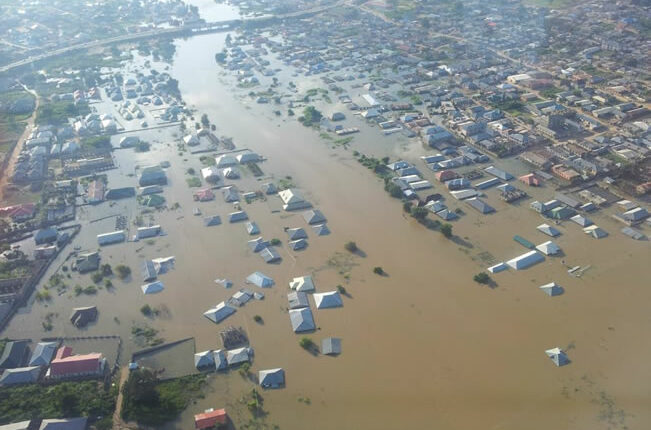Despite the huge housing deficit of over 20 million units in Nigeria, DAYO AYEYEMI reports that the latest flooding in many states has further depleted the nation’s housing stock, thereby widening the accommodation gap among Nigerians.
No fewer than 203,371 housing units have been damaged by flooding ravaging villages, towns, cities and farmlands across Nigeria in the last one month.
According to the Federal Government’s report, the disaster partially damaged 121,318 houses totally damaged 82,053 houses, partially damaged 108,392 hectares of farmlands and totally damaged 332,327 hectares of farmlands, all across Nigeria.
The natural disaster also claimed 603 lives, affected 2,504,095 persons and displaced 1,302,589 persons across the country.
By this damaged houses’ figures, the nation’s housing deficit of over 20 million units, according to the estimates by the United Nations (UN), has further been widened by 203, 371 units, thereby aggravating issue of homelessness among Nigerians.
The number of dwelling units reported to have been damaged by the deluge is not part of the housing units demolished by various government’s agencies during the year for one infraction or the other.
From Kogi State to Anambra, Delta, Cross River, Rivers and Bayelsa states, the impacts of the ravaging flood are enormous as people struggle to move out of their homes to safe locations.
However, as Nigerians continue to lament the impacts of flooding across the country, looking for succor, the Federal Government has warned that the country was not yet out of the wood, disclosing that five states are still at risk of experiencing flooding up to November, this year.
Worried by the destructions, experts in the built environment have expressed concerns over the increasing housing deficit in the country, suggesting ways to combat the perennial flooding, which they claimed was occasioned by the opening of Cameroon’s Dam and climate change/ global warming.
Speaking about the deluge, one of the affordable housing’s advocates in Nigeria, Mr. Kunle Faleti, described flooding as the “number one natural disaster” in most of the states in Nigeria.
“Flooding is a real problem for those individuals living in flood plains and flood damage could be very devastating. Last year, flood devastated a wide area of Lagos (Etiosa/Lekki/Ibeju/Ikorodu/Badagry) and caused approximately N10 billion in damages,” he said.
According to him, he pointed out that flooding issues were being addressed by constructing sea walls, levees and dams (Ogun/Osun River and Majidun).
Despite these efforts, he said they remained temporary measures and would not prevent the force of nature at its worst.
National flood insurance program
To mitigate against loss, the US-based professional, Faleti canvassed the need for the National Flood Insurance Program
According to Faleti, the National Assembly should as a matter of urgency pass a Flood Disaster Protection Act.
The Act, he explained would require buildings located in identified flood hazard areas to have flood insurance coverage as a condition of receiving federal and state aid or loans from federally insured banks for federal disaster assistance.
According to him, Primary Mortgage Institutions and banks must ensure that a flood insurance policy is in place before disbursing on any loan which is secured by a property located in a special flood hazard area (SFHA)
“Flood insurance is a common sense risk-management tool for both lenders and borrowers. The premiums would be a small cost compared to the potential loss from a flood.
“Lenders can, at their discretion, require flood insurance even for property outside of SFHAs.”
“For lenders, It is important to have a quality control review program to verify that borrowers obtain at least the minimum required coverage.
“The review should include checking insurance policies upon receipt from the insurance company/agent to confirm that the policies were written for the correct risk zone noted in the initial flood determination,” he said.
He noted that home owner’s policies usually/generally did not provide flood coverage, saying this was highlighted in bold letters on most home owner’s policies.
“People are just ignorant. A lot of pressure is put on the government when disaster happens. I have been championing this cause since 2008. “Penny wise, Pounds foolish. There is a great misconception that flood policy is expensive,” he said.
Faleti suggested that financial institutions should legally be required to comply with clearly stated requirements related to flood insurance, including:
– The purchase of mandatory flood insurance under a National Flood Policy.
– Lender-placed insurance (LPI) requirements under a Real Estate Settlement Procedures Act
– Flood insurance requirements for Federal Mortgage Bank Nigeria, Nigerian Mortgage Refinance Company, Family Home Funds Limited and all federal mortgage programs.

































